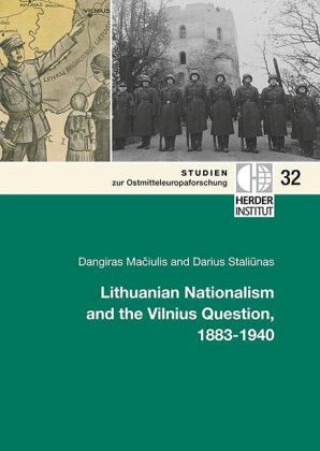
Doručení
Nákupní rádce





Nehodí se? Vůbec nevadí! U nás můžete do 30 dní vrátit
 Dárkový poukaz
V libovolné hodnotě
Dárkový poukaz
V libovolné hodnotě
S dárkovým poukazem nešlápnete vedle. Obdarovaný si za dárkový poukaz může vybrat cokoliv z naší nabídky.
Lithuanian Nationalism and the Vilnius Question, 1883-1940
 Angličtina
Angličtina
 108 b
108 b
30 dní na vrácení zboží
Mohlo by vás také zajímat


According to the 1897 general census of the Russian Empire, the percentage of Lithuanians in the city of Vilnius stood only at 2.1 per cent. At the same time, Lithuanian activists also had no allies in their struggle for the creation both of territorial autonomy first and later of an independent state "within its ethnographic boundaries" with Vilnius as its capital. Yet, irrespective of all these circumstances, the majority of the leaders of the Lithuanian national movement saw Vilnius as their future capital. This book explores the emergence of the notion of Vilnius as the capital of modern Lithuania, which was nurtured in the late 19th and early of the 20th century, as well as examining its evolution and implementation among the masses. Since the nationalists of the time found it hard to imagine a national state with a capital in which the titular nation makes up no more than a few percent of its citizens, Lithuanisation of Vilnius, i.e. the aim that the majority of the city's inhabitants be Lithuanians, is also among the topics discussed in this study. A great part of the book is devoted to the interwar period when Vilnius was part of Poland, and the Lithuanian political and intellectual elite tried to instill the idea of Vilnius as an eternal capital of Lithuania into the masses. This study shows that in interwar Lithuania, the idea of Vilnius as the capital of modern Lithuania became not only a political ideal but also a tool for political manipulation. While this book does not analyse in detail the attitudes held by Jews, Poles, Belarusians or Russians regarding the Vilnius question, it nevertheless points out the counter-arguments of other Nationalities the Lithuanian claims to Vilnius were up against.§§Der 1897 im Russischen Reich durchgeführte Zensus bezifferte den litauischen Anteil der Bevölkerung von Vilnius auf lediglich 2,1 Prozent. Gleichzeitig verfügte die litauische Nationalbewegung über keinerlei Verbündete in ihrem Kampf, der zunächst auf die Herstellung territorialer Autonomie, später dann auf die Errichtung eines unabhängigen Staates "in seinen ethnographischen Grenzen" mit Vilnius als Hauptstadt abzielte. Trotz dieser ungünstigen Umstände sahen ihre zentralen Akteure Vilnius als zukünftige litauische Hauptstadt an. Das vorliegende Buch untersucht das Zustandekommen dieses Ansinnens, das im späten 19. und frühen 20. Jahrhundert aufkam, und fragt nach seiner Entwicklung und Implementierung. Da für die Nationalbewegung eine Hauptstadt schwer vorstellbar war, in der die Titularnation lediglich wenige Prozent ihrer Bevölkerung ausmachte, liegt ein weiterer Fokus der Studie auf die für nötig erachtete Litauinisierung Vilnius'. Ein großer Teil des Buches befasst sich mit der Zwischenkriegszeit, in der Vilnius zu Polen gehörte, und in der die litauische politische und kulturelle Elite Anstrengungen unternahm, die Idee von Vilnius als ewiger Hauptstadt Litauens in die breite Bevölkerung zu tragen. In dieser Periode, so ein Ergebnis der Studie, wurde Vilnius nicht nur zu einer politischen Idee, sondern entwickelte sich gleichzeitig zu einem Werkzeug politischer Manipulation. Auch die Ansprüche anderer Nationalitäten, die beispielsweise von Juden, Polen und (Weiß-)Russen vorgebracht wurden und denen sich die litauische Nationalbewegung gegenübersah, werden skizziert.
Informace o knize
 Angličtina
Angličtina
Kategorie




 Jak nakupovat
Jak nakupovat




























